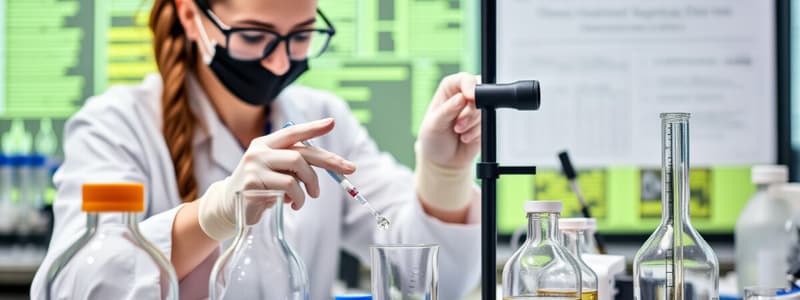Podcast
Questions and Answers
What is the primary purpose of a hypothesis in an experiment?
What is the primary purpose of a hypothesis in an experiment?
- To propose an explanation that can be tested (correct)
- To provide a rationale for the research
- To outline the materials needed for the experiment
- To summarize the results of the experiment
Which of the following best describes an independent variable?
Which of the following best describes an independent variable?
- The element that is manipulated to observe its effects (correct)
- The factor that is measured in the experiment
- The outcome that is affected by changes in another variable
- The variable that remains constant throughout the experiment
What does the term 'control group' refer to in an experimental setup?
What does the term 'control group' refer to in an experimental setup?
- The group that undergoes the experiment without any variables
- The group that does not receive the treatment, serving as a baseline (correct)
- The group that experiences natural variations
- The group that receives the treatment being tested
Why are results replicated in scientific research?
Why are results replicated in scientific research?
Which of the following is a characteristic of a well-designed experiment?
Which of the following is a characteristic of a well-designed experiment?
Flashcards are hidden until you start studying
Study Notes
Purpose of a Hypothesis
- A hypothesis serves as a testable prediction about the relationship between variables in an experiment.
- It guides the research by providing a focused question to be explored.
Independent Variable
- An independent variable is the factor that is manipulated or changed by the researcher to observe its effect on the dependent variable.
- It is the presumed cause in a cause-and-effect relationship in an experimental study.
Control Group
- A control group is a baseline group in an experiment that does not receive the experimental treatment or intervention.
- It is used for comparison against the experimental group to determine the effect of the independent variable.
Replication of Results
- Results are replicated in scientific research to ensure reliability and validity of findings.
- Reproducibility helps confirm that results are consistent and not due to chance or experimental error.
Characteristics of a Well-Designed Experiment
- A well-designed experiment includes a clear and testable hypothesis, controlled conditions, and proper identification of variables.
- It ensures that data collection methods are reliable and that the experiment can be repeated to verify results.
Studying That Suits You
Use AI to generate personalized quizzes and flashcards to suit your learning preferences.




